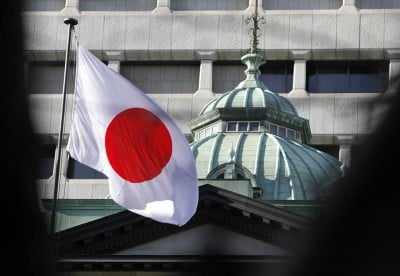 © Reuters. USD/JPY +0.83% Add to/Remove from Watchlist Add to Watchlist Add Position
© Reuters. USD/JPY +0.83% Add to/Remove from Watchlist Add to Watchlist Add Position Position added successfully to:
+ Add another position Close JP225 +0.60% Add to/Remove from Watchlist Add to Watchlist Add Position
Position added successfully to:
+ Add another position Close JP10Y... -0.84% Add to/Remove from Watchlist Add to Watchlist Add Position
Position added successfully to:
+ Add another position Close
Investing.com-- The Bank of Japan held interest rates at ultra-low levels on Tuesday and slightly altered the rhetoric around its yield curve control (YCC) policy, while also forecasting higher inflation levels in the coming years.
The BOJ left its short-term interest rate at -0.1%, and said it will use the upper end of its YCC band- 1% as a reference cap for its market operations. The move reflects a slight change in the BOJ's messaging around its otherwise strict YCC policy, and could reflect some more flexibility.
"With extremely high uncertainties surrounding economies and financial markets at home and abroad, it is appropriate for the bank to increase the flexibility in the conduct of yield curve control," the BOJ said in a statement.
The bank currently allows 10-year yields to move in a range of -1% to 1%, as part of its YCC policy, and left that rate unchanged.
The BOJ also said it will continue with its current pace of asset purchases and quantitative easing to stimulate the economy, citing continued uncertainty over higher inflation and worsening global economic conditions.
The move comes as the bank struggles to maintain a balance between supporting the Japanese economy, stemming further weakness in the yen while also grappling with stickier inflation levels.
The yen slid 0.5% after the BOJ decision, briefly retaking the 150 level against the dollar as the decision disappointed market participants hoping for a more hawkish move. Benchmark 10-year yields on Japanese government bonds trimmed some gains after the decision, moving further below the 1% ceiling.
The BOJ said it expects core consumer inflation (which excludes fresh food) to remain above its 2% target through fiscal 2024, and that risks to prices are “skewed to the upside for fiscal 2023.”
The central bank also expects price increases to be higher than previously expected, particularly due to steeper imports costs and their passing on to consumers by local businesses.
Recent data showed that Japanese consumer inflation grew more than expected in September, while inflation in Tokyo also grew past expectations in October. Consumer inflation has remained above the BOJ’s target range for 18 months running.
The BOJ also forecast increased downside pressure on Japanese economic growth, particularly due to worsening growth in the country’s biggest trading partners. It cited this as a need to continue with its stimulative measures.
While Japanese economic growth remained somewhat resilient this year, the pace of growth between quarters slowed amid increasing pressure from inflation. Economic conditions in Japan’s biggest export destinations also deteriorated, a trend that heralds more pressure on the world’s third-largest economy.
BOJ keeps negative rates, tweaks YCC language amid higher inflation 4





